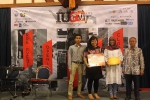ITB’s Pharmacy Professor Urges Public to be More Careful in Choosing Indonesian Herbal Medicines
By M. Naufal Hafizh, S.S.
Editor M. Naufal Hafizh, S.S.

BANDUNG, itb.ac.id – Professor of the School of Pharmacy, from the Pharmaceutical Biology Expertise Group, Institut Teknologi Bandung (ITB), Prof. Dr. apt. Muhamad Insanu, S.Si., M.Si., was a guest speaker in the “Healthy Life” segment on KLCBS Radio, airing on channel 100.4 FM. The session featured an interactive dialogue between Professor Insanu and KLCBS announcer, Yanti Rangkuti, focusing on Indonesian traditional medicines which took place on Wednesday (21/2/2024).
As a country with the third highest biodiversity in the world, Indonesia is rich in various plant species that have been used for generations as traditional herbal medicines.
Prof. Insanu explained that medicine coming from natural sources encompasses pharmaceutical preparations that come from plants, animals, minerals, microorganisms, and more. However, in common practice, natural medicine often refers specifically to herbal remedies as it is the most commonly found.
Natural medicines are classified into four main groups: herbal medicine, standardized herbal medicine, phytopharmaceuticals, and other herbal remedies.
He mentioned that to this date there are still a lot of people who use natural medicines based on beliefs passed down from generation to generation without clear empirical evidence. This presents a challenge for educational and research institutions like ITB to provide scientific evidence supporting claims about the benefits of natural medicines in society.
Procedurally, these medicines need to undergo a series of testing stages before they are confirmed to be safe and effective to use. However, this kind of testing process is a long and complex procedure, thus requiring large funds and time.
“The medicine testing process takes time, this may also be one of the obstacles as to why not many natural medicines have been clinically proven.” he remarked.
Regarding the content of natural medicines, Prof. Insanu explained that a single type of medicinal plant typically contains dozens to hundreds of compounds. However, there is one type of compound called a marker compound that serves as an indicator of the quality of the plant’s content. Each plant typically has different marker compounds that indicate its function and benefits.
He highlighted the importance of public literacy on natural medicine to provide information about its contents, effectiveness, side effects, and indications. He suggested that individuals enhance their literacy independently, one of them is by looking up at BPOM website and entering keywords for the medicine in question so the public can access all relevant information about it.
“By checking the BPOM’s website, we can see which medicines have been registered with BPOM. This can at least provide us with guarantees regarding the requirements for natural medicines,” he said.
Quality natural medicines must meet three main requirements: effectiveness, safety, and quality. All medicines that have obtained BPOM are guaranteed to meet these three requirements as a standard.
Nevertheless, he still urges the public to not consume natural medicine rashly. Consultation with a doctor is still necessary, especially when combining the use with conventional medicine.
“Medicine is like a double-edged sword. It can function as medicine or as poison, the only difference lies within the dose. When the dose is correct, it will function as a medicine. However, when the dose is excessive, it will act as a poison,” he concluded.
Reporter: Hanifa Juliana (Urban and Regional Planning, 2020)
Translator: Sherina Wijaya (Geological Engineering, 2019)
Editor: Hanna Daniela Ayu (Aerospace Engineering, 2021)

.jpg)
.png)
.jpg)
.jpg)
.jpg)


.jpg)
